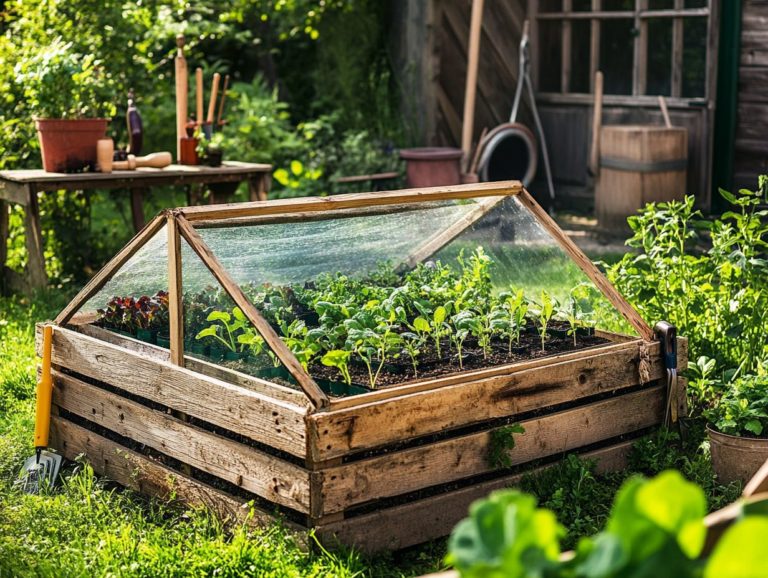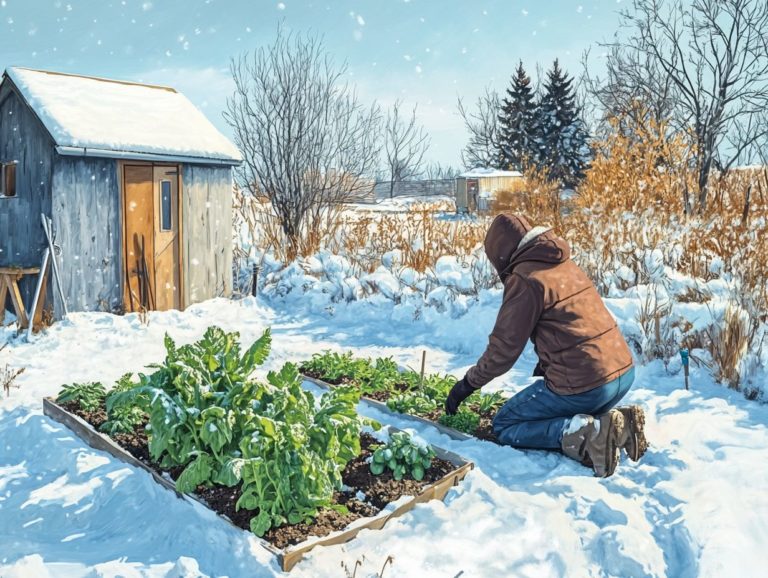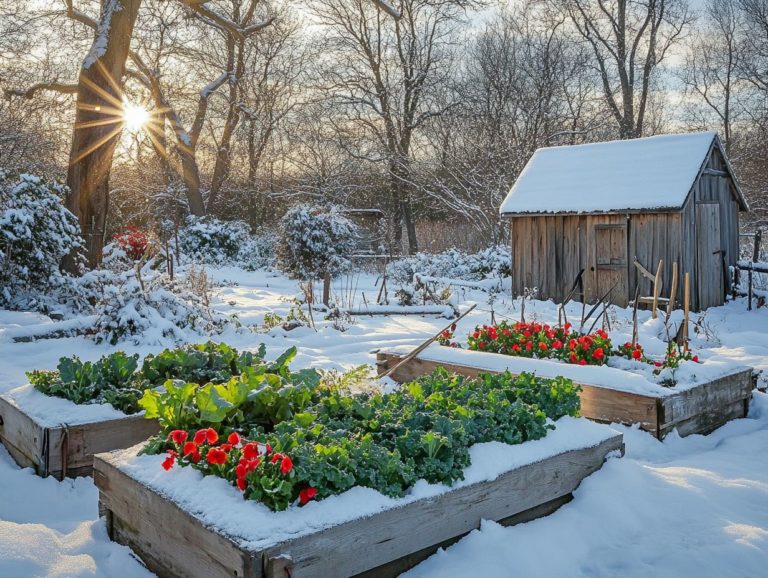Choosing the Right Vegetables for Winter
As winter’s chill envelops the landscape, your plates can still burst with vibrancy and nutrition. Thanks to a rich array of seasonal vegetables available during these colder months.
Incorporating winter vegetables into your meals supports your health with their impressive nutritional value and champions sustainability by supporting local farming.
From robust root vegetables to tender leafy greens and versatile squashes, you’ll discover a variety of winter vegetables. Learn how to select the freshest options and explore creative cooking techniques to savor their flavors.
You ll find practical tips for storing and preserving your winter harvest to make the most of this seasonal bounty.
Contents
- Key Takeaways:
- Why Eating Winter Vegetables is Important
- Types of Winter Vegetables
- How to Choose the Best Winter Vegetables
- Ways to Prepare and Cook Winter Vegetables
- Storage and Preservation of Winter Vegetables
- Frequently Asked Questions
- What vegetables are best for growing in the winter?
- How can I ensure my winter vegetables survive the colder temperatures?
- What are the benefits of growing winter vegetables?
- Are there any vegetables that don’t do well in the winter?
- Can I grow vegetables indoors during the winter?
- Are there any tips for choosing the right winter vegetables for my area?
Key Takeaways:
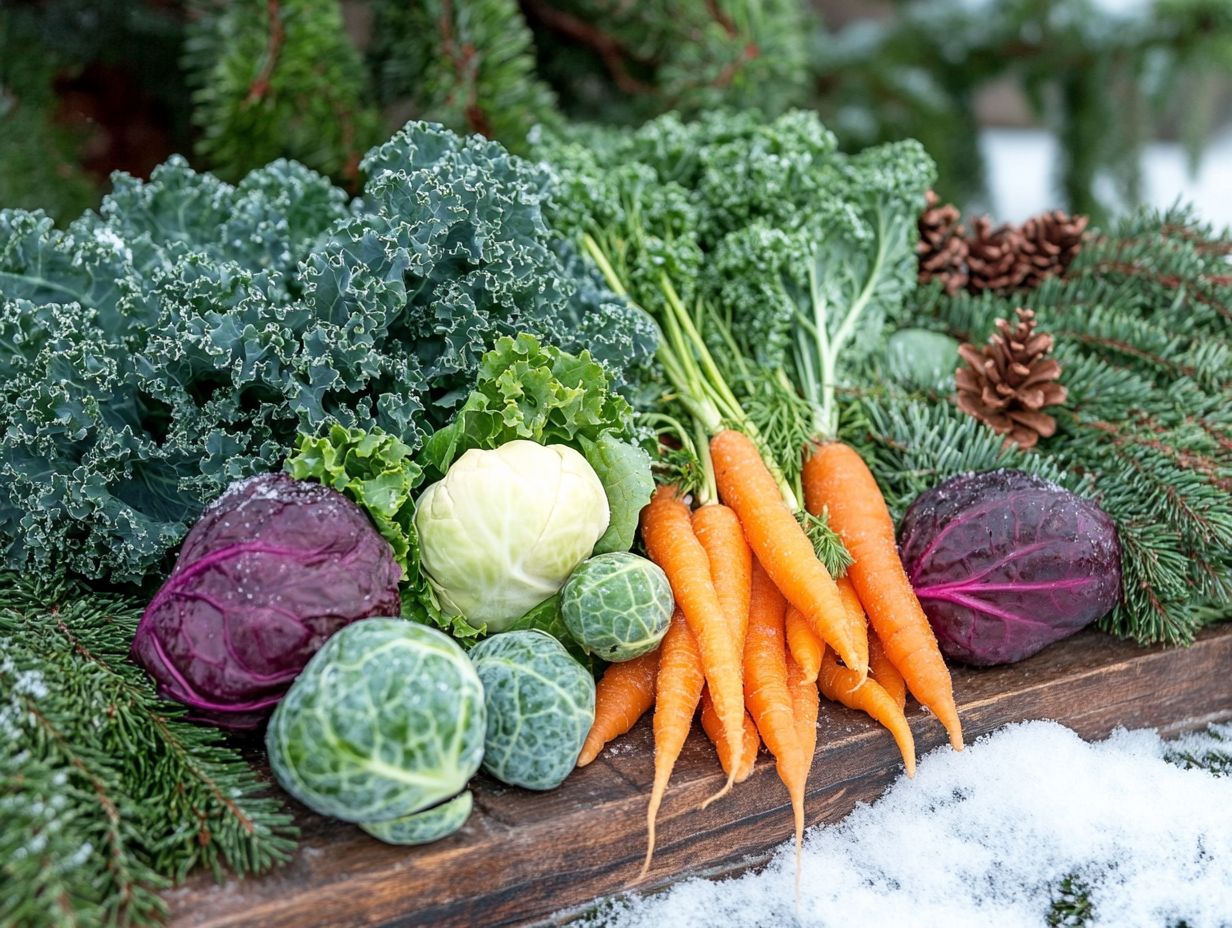
- Eating winter vegetables is crucial for maintaining a healthy and balanced diet, as they are packed with essential nutrients and are readily available during the season.
- Root vegetables, leafy greens, and squashes are some of the best choices for winter vegetables, providing a variety of textures and flavors to incorporate into meals.
- When selecting and preparing winter vegetables, keep in mind freshness and flavor by choosing firm and vibrant produce. Experiment with different cooking techniques and recipes to enhance their taste.
Why Eating Winter Vegetables is Important
Eating winter vegetables is crucial for maintaining a healthy diet during the colder months. They offer essential nutrients that support overall health and emotional well-being, especially when Seasonal Affective Disorder can impact your mood. For those looking to maximize their harvest, planning your winter vegetable garden layout can make a significant difference.
Vegetables like kale, carrots, and garlic not only enhance your nutrient intake but also promote the joy of homegrown produce and sustainable gardening practices.
Embracing these winter vegetables can truly elevate your winter gardening experience and enrich your life during this season.
Nutritional Benefits and Seasonal Availability
Winter vegetables are an exceptional source of nutrition, brimming with essential vitamins, minerals, and antioxidants that become essential during the colder months.
Don t miss out! Add vibrant leafy greens like kale and Swiss chard to your meals for a nutrient boost. They re rich in vitamins A, C, K, and folate.
Vegetables like broccoli and Brussels sprouts provide a wealth of vitamin C, fiber, and cancer-fighting compounds. These nutrient-dense options are not only abundant in winter but also vital for supporting your immune system, enhancing digestion, and boosting your overall energy levels.
By adding these vibrant vegetables to your diet, you ll make a significant impact on your health and vitality, particularly when fresh produce can be scarce during the chilly months.
Types of Winter Vegetables
Exploring the diverse types of winter vegetables unveils a remarkable selection that caters to both gardeners and culinary enthusiasts. To grow these veggies successfully, it’s important to know how to choose the right soil for winter gardening. You’ll discover hearty root vegetables like carrots and beets, which offer robust flavors and textures.
Additionally, nutrient-rich leafy greens such as kale and spinach provide essential vitamins during the colder months. Don’t overlook the versatile squashes and pumpkins, which can elevate both the taste and nutritional value of your winter meals.
Root Vegetables
Root vegetables are your go-to in winter gardening, celebrated for their robust flavors and ability to thrive in the colder months. Consider exploring vegetables that thrive in cold weather like carrots, beets, sweet potatoes, and turnips as your winter gardening allies.
These resilient plants sustain you during the chill and come packed with a wealth of nutritional benefits. They are brimming with essential vitamins and minerals.
If you’re ready to embrace winter gardening, you ll find it incredibly rewarding to know that these vegetables can be harvested even after frosts, which actually enhances their sweetness.
With various preservation methods at your disposal like canning, freezing, or storing them in a root cellar you can relish your harvest long after the growing season has passed. This practicality, combined with their rich nutrient profiles featuring fiber, antioxidants, and vital nutrients, makes root vegetables an exceptional choice for anyone mindful of their health.
Start exploring your local markets today to discover the freshest winter vegetables and boost your meals!
Leafy Greens
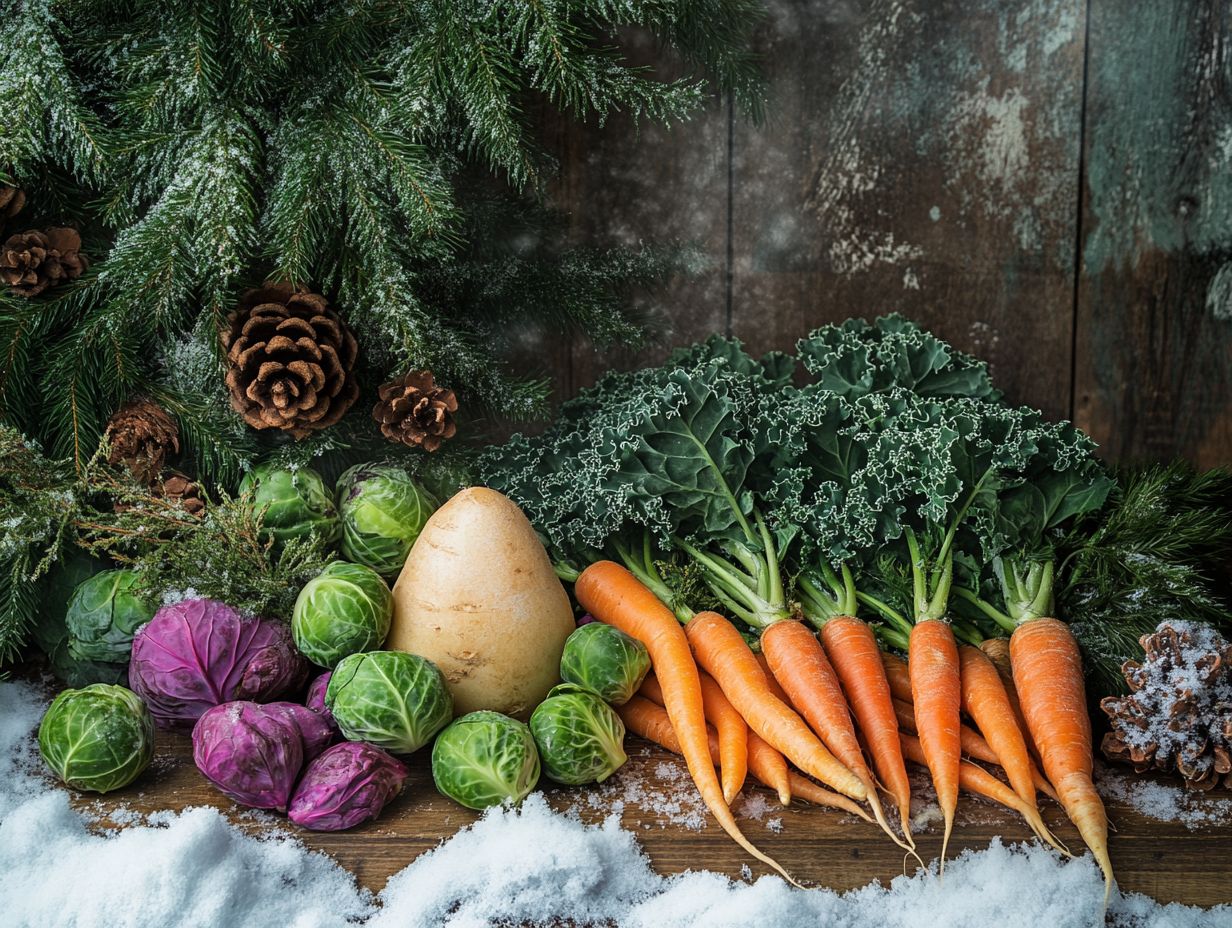
Leafy greens like spinach, kale, and chard are not just nutritious; they can elevate your emotional well-being. They make a splendid addition to your winter garden.
Incorporating these vibrant greens into your daily meals provides essential vitamins and minerals. These nutrients can enhance your mood and combat nutrient deficiencies that often occur during the darker months.
Packed with iron, calcium, and antioxidants, these vegetables play a vital role in alleviating symptoms of seasonal affective disorder (SAD). This type of depression occurs during winter months and can be alleviated by these greens, supporting both your mental health and energy levels.
For those with a passion for gardening, growing leafy greens in winter is more achievable than it appears. With the right approach think containers or raised beds, paired with protective covers you can create an optimal microclimate that allows these resilient plants to flourish, even in the chill of winter.
Squashes and Pumpkins
Squashes and pumpkins are truly versatile winter vegetables that elevate your culinary creations. They enhance flavor, nutrition, and visual appeal in both your meals and garden.
These delightful vegetables offer a remarkable array of varieties, each with its own distinct flavors and textures. From the sweet allure of butternut squash to the robust character of acorn squash, you have an abundance of options at your fingertips.
Most squashes and pumpkins thrive in well-drained soil, basking in full sunlight. They require consistent watering for a fruitful harvest.
Once you’ve picked them, they can be stored in a cool, dry place for several months. This allows you to relish their goodness long after the growing season has ended.
You can also enjoy these vegetables by cooking or preserving them through methods like canning, freezing, or roasting. Savor their benefits throughout the chilly months ahead.
How to Choose the Best Winter Vegetables
Selecting the finest winter vegetables requires you to grasp the unique conditions of your gardening space. To learn more about making informed choices, check out this guide on how to choose the right winter vegetables and make well-informed decisions regarding seed selections and planting schedules to ensure a plentiful harvest filled with the freshest produce.
Tips for Selecting Fresh and Flavorful Produce
When selecting fresh and flavorful winter vegetables, pay close attention to factors like color, firmness, and seasonal availability. For more guidance on this process, check out how to choose the right winter garden variety. This helps ensure you’re getting the best quality produce.
Look for deep, vibrant colors; they often indicate higher nutrient content and freshness. Firmness is also essential if a vegetable gives too much when pressed, it could be overripe or past its prime.
Understanding when various vegetables are in season is crucial. Those harvested at their peak will deliver optimal taste and quality.
Keep an eye out for signs of preservation, too. Choose produce that looks fresh, free of blemishes, and not overly wrapped, which suggests minimal processing.
By keeping these tips in mind, you can confidently select plants for a winter garden that elevate both the flavor and nutrition of your meals.
Ways to Prepare and Cook Winter Vegetables
Get ready for a delightful culinary adventure with winter vegetables! These seasonal gems present a stunning array of flavors and textures, waiting for you to enhance them through various cooking techniques and creative recipe ideas.
Embrace the opportunity to craft exquisite dishes using fresh vegetables that not only nourish the body but also tantalize the palate.
Share your favorite winter vegetable recipes with us!
Recipe Ideas and Cooking Techniques
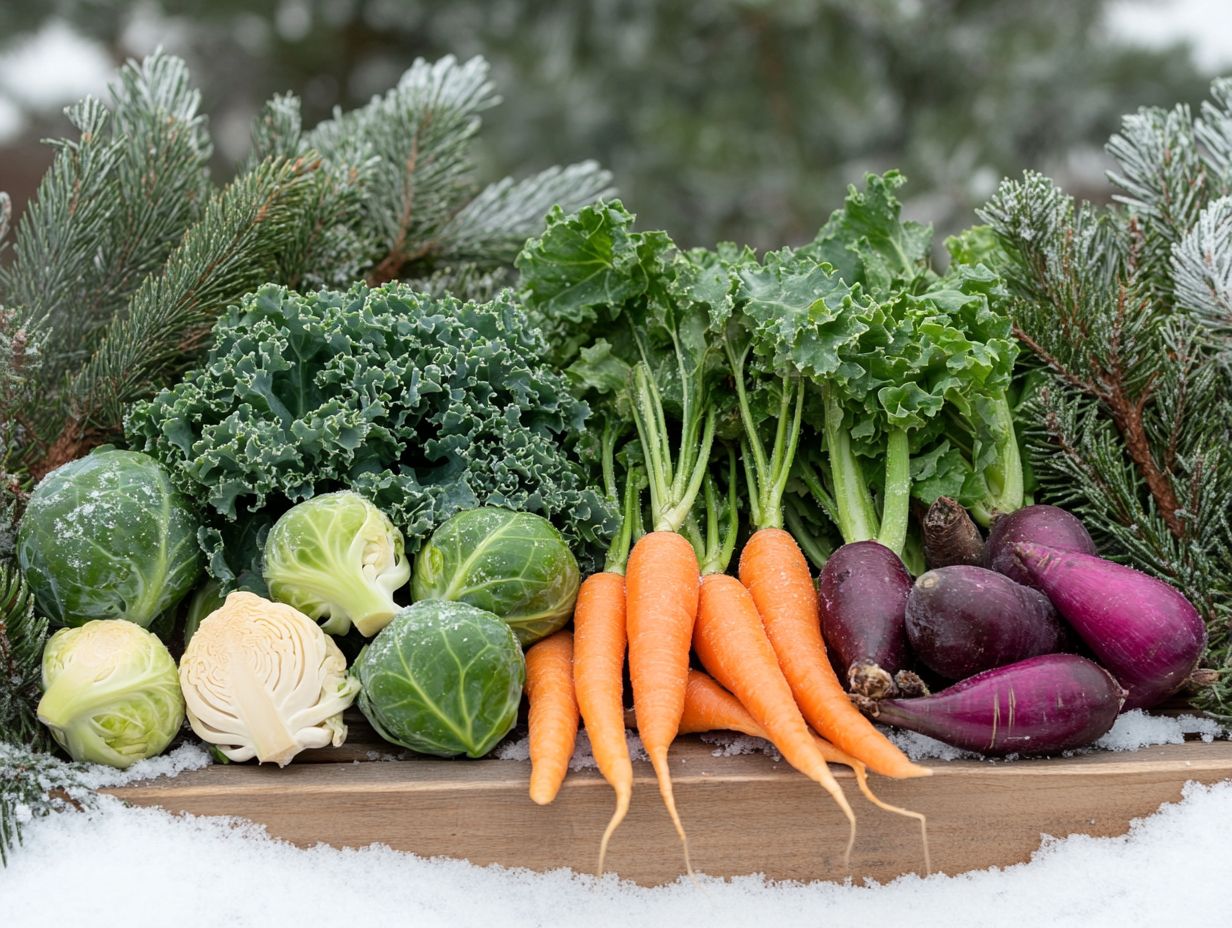
Using winter vegetables opens up new cooking possibilities. You can create exciting recipes that enhance their natural flavors and boost their nutrition.
These hearty vegetables include Brussels sprouts, root vegetables like carrots and turnips, and leafy greens such as kale. You can transform them through various methods, including roasting, saut ing, steaming, and even pickling.
Imagine the rich, caramelized sweetness of roasted squash, drizzled with a rich balsamic vinegar sauce, or the vibrant freshness of saut ed greens tossed with fragrant garlic and velvety olive oil.
If you’re interested in preserving the goodness of winter produce, techniques like freezing, canning, and fermenting not only maintain freshness but also introduce delightful flavors to your meals throughout the year.
With these diverse approaches, you can easily incorporate seasonal ingredients into your cooking while enjoying their numerous health benefits.
Storage and Preservation of Winter Vegetables
Storing winter vegetables properly is key to enjoying their flavors all season long. By using the right techniques, you can ensure that your vegetables remain fresh and safe to eat throughout the season.
Simple Tips for Fresh and Safe Winter Vegetables
Keeping your vegetables fresh and safe to eat requires a commitment to best practices in storage, handling, and preparation. This ensures that your winter vegetables retain their quality and nutritional integrity.
Start with proper harvesting techniques. Improper handling can lead to spoilage even before storage. After harvesting, cool the vegetables quickly to slow down the degradation process, and wash them gently to eliminate any dirt or contaminants.
For storage containers, choose breathable options that allow moisture to escape, as this helps prevent rot. It’s essential to monitor storage conditions closely, paying attention to temperature and humidity levels, as these factors significantly affect the longevity of your winter produce.
Understanding the fundamentals of proper canning and freezing techniques will also help preserve the nutritional value of these seasonal treasures.
Frequently Asked Questions
What vegetables are best for growing in the winter?
Some great options for winter vegetables include Brussels sprouts, kale, turnips, and carrots.
How can I ensure my winter vegetables survive the colder temperatures?
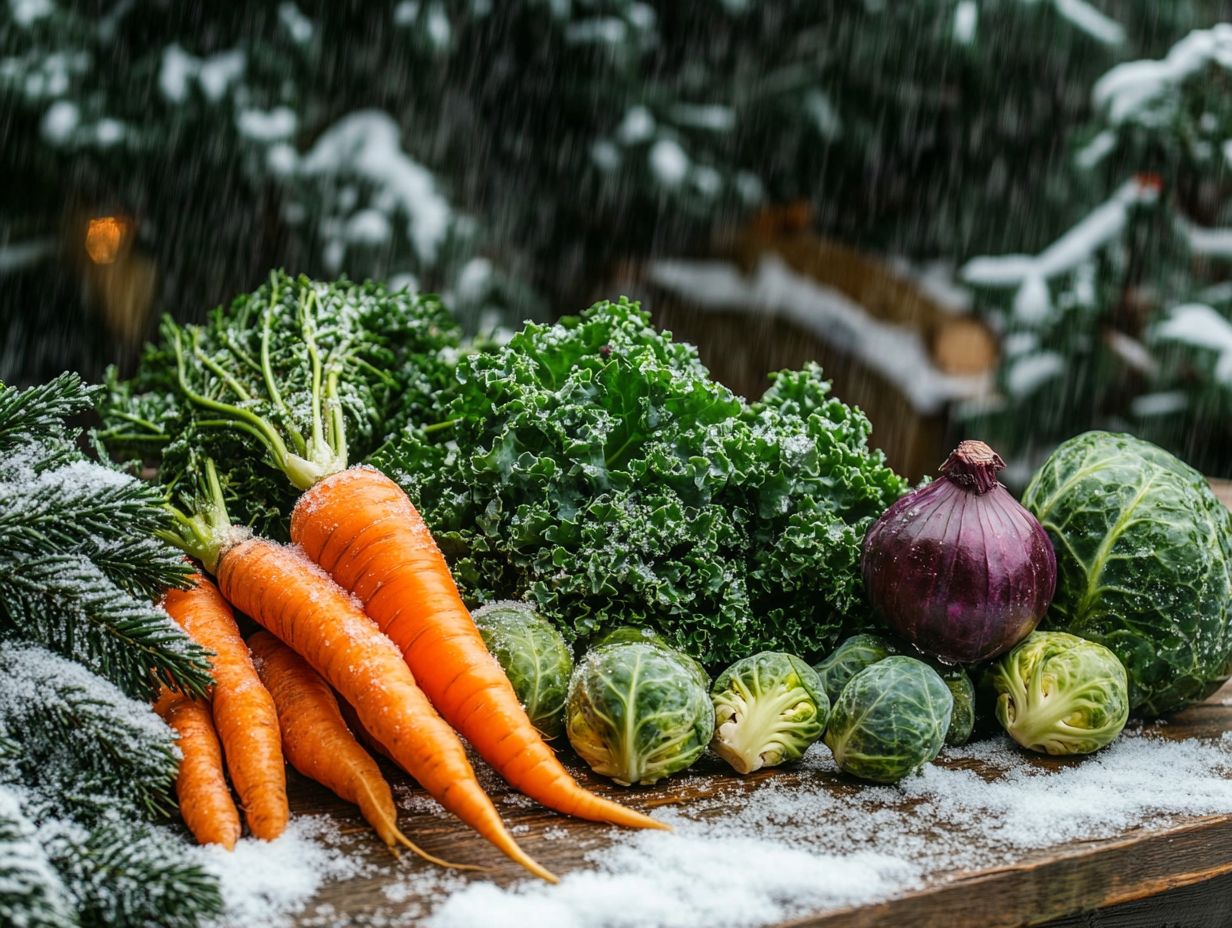
Choosing cold-hardy vegetables and providing adequate protection, such as using a hoop house or cold frame, can help your winter vegetables survive and thrive in colder temperatures.
What are the benefits of growing winter vegetables?
Growing winter vegetables not only brings fresh produce during the colder months but also helps extend your growing season. They provide a source of exercise and stress relief during winter, especially for those struggling with seasonal affective disorder.
Are there any vegetables that don’t do well in the winter?
Some vegetables, such as tomatoes and peppers, do not tolerate cold temperatures well and are not recommended for winter growing. Instead, it’s best to stick with cold-hardy options, like those highlighted in the benefits of growing root vegetables in winter.
Can I grow vegetables indoors during the winter?
Yes, some vegetables, such as microgreens and herbs, can be grown indoors during the winter. Just ensure they receive enough sunlight or use grow lights to provide adequate light for growth.
Ready to try growing winter vegetables yourself? Share your experiences and tips to inspire others on this gardening journey!
Are there any tips for choosing the right winter vegetables for my area?
Discover the best winter vegetables for cold climates! Some may do better in colder regions, while others thrive in milder climates.
Research which vegetables grow longer in winter. Additionally, understanding soil needs for winter vegetables is crucial. Pay attention to the timing of when to plant (planting schedule) and the types of seeds (seed choices) you select.

